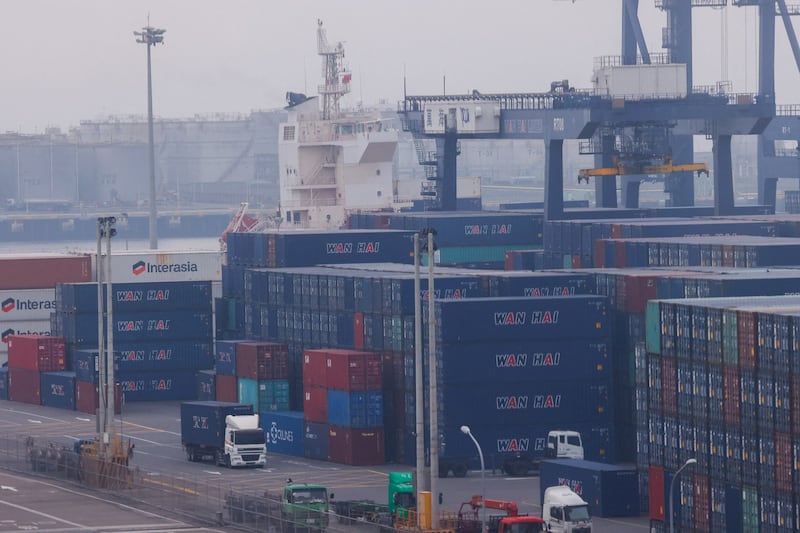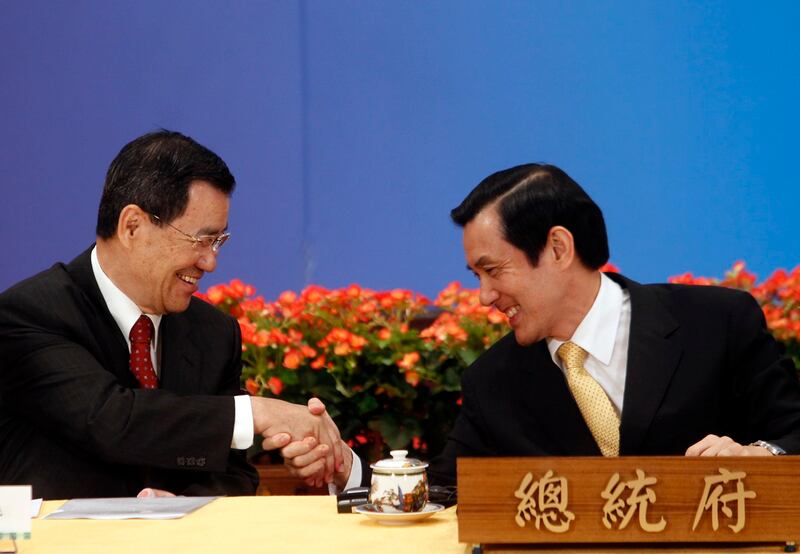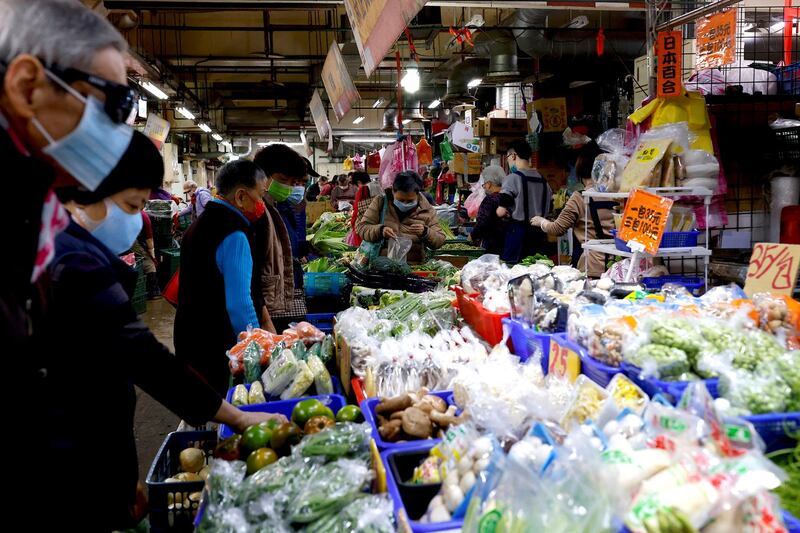When choosing the independent-leading incumbent vice-president as their new leader, the Taiwanese people not only affirmed their commitment to their current political discourse but also voiced a strong desire for improved economic ties with the Chinese mainland.
This optimistic vision, however, is not without its complexities, suggesting that the journey ahead could be more arduous than initially hoped.
China is Taiwan’s biggest trading partner, but tension between Beijing and the island’s ruling party, the Democratic People’s Party (DPP), which the President-elect Lai Ching-te belongs to, has been high in the past eight years that the DPP has been in power, marred inevitably by waning economic ties.
With a third four-year term for the DPP ahead, cross-strait economic relations are not expected to remain in the standoffish climate they currently are but could take a further dive, as China could continue to weaponize economics as a tactic, according to experts who spoke to Radio Free Asia.
“The election outcome wasn’t what Beijing wanted, though it was within the Chinese government’s expectation,” said Cheng Cheng-ping, a professor of finance at the National Yunlin University of Science and Technology in Taipei.
“Post-election, cross-strait relations on the economic front will worsen,” Cheng said, in addition to military tactics like Chinese vessels encircling the island.
Trade between Taiwan and China has fluctuated amid a collapse in exports and imports, which could also be attributed to the COVID-19 pandemic. Last year, exports rebounded 25%, but that came from a low base of a negative 3.2% in 2022, according to Taiwan Customs data.
Economists in Taiwan said the problem lies more with Beijing than the Taiwan side, where the slowing domestic economy is hamstrung by a property market crisis and mounting local government debts, issues that authorities are struggling to fix.

Chinese President Xi Jinping’s economic decisions are not rooted in improving China’s economy but are related to politics or the Chinese Communist Party’s interests, according to Li Chen-yu, Taishin Financial Holdings’ chief economist.
“If you look at it [the economic issue] from this angle, you’d see that they would do things that benefit themselves at the expense of others,” said Li.
“Therefore, the new government when dealing with China needs to have some bottom line, that is you can’t separate diplomacy, security and economics. There needs to be a team [from the new government] that works together in a consolidated approach. I feel that this is something we need to think about.”
Li also doesn’t believe that any ongoing trade disputes between the two sides could be effectively resolved through the World Trade Organization route as urged by Taiwan’s economic affairs ministry.
Just days ahead of last Saturday’s elections, China’s commerce ministry said it was considering suspending concessions on more Taiwanese goods under the Economic Cooperation Framework Agreement (ECFA) – the free trade agreement signed with China during the rule of the Beijing-friendly Kuomintang, or KMT.
The agreement was signed in 2010 in the hope that China would stop pressuring other countries to avoid free trade agreements with Taiwan. In December, the Chinese already suspended tariff relief on 12 petrochemical products.

“China won’t engage as this means dealing with it at a country-to-country level,” Li said at a post-election symposium by Taiwanese think-tank the Institute of National Policy Research, with reference to Beijing’s long-held position that Taiwan was a part of the People’s Republic of China.
He urged that the new government should instead focus on brokering new free trade agreements with other individual economies and reducing its emphasis on ECFA.
“Taiwanese relations with Japan are currently at their peak,” Li said, adding that the ties are enhanced by activity in the semiconductor industry by both sides.
He also downplayed the benefit of joining multilateral agreements such as the Comprehensive and Progressive Agreement for Trans-Pacific Partnership that the opposition presidential candidate KMT’s Hou Yu-il had pushed for in his election campaign.
“Multilateral agreements are complex … all it takes is one country to disagree,” Li said.
Dialed up pressure
China regards Taiwan as a renegade province that should be politically reunited with the mainland by force if necessary. The democratic island of Taiwan has been self-governing since being separated from mainland China in 1949 after the Chinese Civil War.
Beijing has dialed up diplomatic and economic pressure on the island, as well as increasing military maneuvers in the Taiwan Strait since the incumbent Tsai Ing-wen’s administration first came to power in 2016, as Tsai and the DPP refuse to acknowledge that Taiwan and the mainland belong to “One China.”
To reduce economic reliance on China and diversify risks, Tsai has promoted a southbound policy to increase trade with South Asia and ASEAN, as well as with Australia and New Zealand.
According to Taiwan Customs data, exports to ASEAN rose 14.7% in 2022 but contracted 5% last year. But exports to China shrank more – widening from a negative 3.8% to a negative 20.9% in 2023.
Last year, Taiwanese-approved outbound investments to the Chinese mainland plunged by nearly 40% to US$3 billion, the lowest since 2002, the Ministry of Economic Affairs said on Tuesday. This compared with $9.6 billion when the DPP came into power in 2016.

While these official numbers are indicative of the investment trend, they do not include investments routed via popular third-party conduits such as Hong Kong to enter the Chinese market.
The ministry’s investment review department noted that China-bound investments peaked in 2010 when they accounted for a whopping 84% of all outbound investments. The trend took a downturn from 2016, with the share dropping to 11% last year.
The trade and tech wars between the United States and China, coupled with geopolitical uncertainty in the region, forced Taiwanese businesses to recalibrate their global supply chains to diversify their interests to the U.S., European, Japanese and other Asian markets, the department noted.
The decline is also reflected in the number of Chinese tourists visiting Taiwan. The annual growth rate of inbound Chinese visitors has been on a decrease since 2016 until 2020, when Taiwan was closed off to foreigners during the pandemic. But reopening hasn’t seen the return of Chinese tourists as Beijing’s ban on Chinese individuals and tour groups to Taiwan has remained since August 2019 and 2020 respectively due to cross-strait tensions.
Limited moves
Cheng from the National Yunlin University of Science and Technology believes there are limited ways in which China can economically pressure Taiwan on the back of its own domestic struggle.
For instance, China’s suspension of tariff relief on Taiwanese petrochemical imports last month could also hurt Chinese businesses that import competitively-priced Taiwanese products in an integrated global supply chain.
But what Beijing “can’t touch” is Taiwan’s high-tech sector, Cheng said, which is bound by the Information Technology Agreement under the auspices of the World Trade Organization, keeping tariffs at zero.
“And the high-tech sector is Taiwan’s core. So it [China] could only target the traditional industries through ECFA to continue to penalize Taiwan, where cross-strait economic relations have been bad in the past few years.”
Cheng expects cross-strait economic activities to stay weak, more so as a result of China’s increased inward-looking investment policies that have shooed off foreign interests, including Taiwanese businesses, in turn crimping its own demand for imports.
He cited a similar decline in China’s imports from Japan and South Korea, which, according to Chinese official data, fell 14% and 20% respectively in the first 11 months of 2023.
Taiwan’s economy
The fallout from the U.S.-China tech war will become more pronounced this year, experts say. This is in part due to the increased scrutiny to plug loopholes introduced by new American regulations.
Cheng said as the Americans stepped up controls, they noticed ways of circumventing them from the Taiwanese players. He added that U.S. officials would come to Taiwan to explain these new curbs – aimed primarily at China – in detail to Taiwanese companies, which in turn would depress chip exports to China.
Semiconductors and semiconductor-related products, which account for nearly half of Taiwanese exports to China, fell 17% to $904 billion in the first 10 months of 2023.
Taiwan has forecasted GDP growth of 1.4% for 2023, the lowest since the 2008 global financial crisis. Economic issues have elicited the biggest criticisms from the Taiwanese people towards the DPP, particularly from the younger generation, who are dissatisfied with low wage growth, high housing costs, and power shortages.

Still, Cheng believes that if geopolitical pressures such as the wars in Ukraine and the Middle East, as well as tensions in the region – which hinge on how U.S.-China relations evolve – do not spread, the Taiwanese economy should be in a healthier state in 2024, boosted by the strength of its tech sector.
“Taiwan’s various economic indicators are not bad – export orders are beginning to increase, excess supplies from the pandemic are being digested. Additionally, foreign investments in Taiwan are growing. Taiwan’s domestic consumption is robust, as is the government taxation revenue.”
Taiwan’s national research institute, the Academia Sinica, has projected 3.02% economic growth for this year.
Edited by Taejun Kang and Mike Firn.

